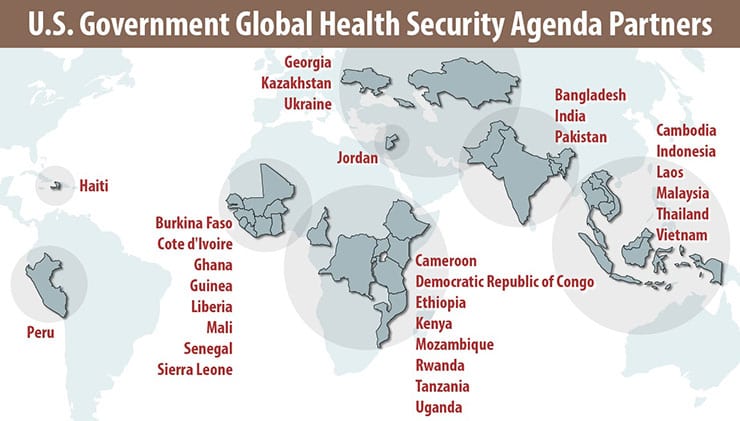Global Health Security Strategy 16/05/2019 – Posted in: Daily News – Tags: biological diseases, global health security agenda, health security, infectious disease, US government
GLOBAL HEALTH SECURITY STRATEGY
For: Preliminary & Mains
Topics covered: Health security, New Action plan/strategy, National health plan, biological diseases, Global Health Security Agenda 2024, Kampala declaration
News Flash
The US government has come up with a first of its kind strategy to prevent, detect and respond to threats from infectious diseases occurring naturally or accidentally.
It is an effort to help improve the world’s ability to stop and contain deadly outbreaks before they spread between countries.
Global Health Security Strategy (GHSS)
- GHSS defines the actions the administration will take by adopting a whole-of-government approach to health security and leveraging the strengths of different federal departments, agencies and funding streams.
- US is creating a safer world by utilizing collective global action to combat global health security threats.
- The US will use bilateral, regional, and multilateral engagements to encourage countries to make health security a national priority.
Three interrelated goals
- Strengthen partner country global health security capacities
- Increase international support for global health security agenda
- A homeland prepared and resilient against global health threats
New Strategy
- Under the new Strategy, the country will work to ensure that every partner country has a plan to achieve self-reliance in the critical area of health security.
- US is Supporting the Global Health Security Agenda as a mechanism to accelerate progress addressing infectious disease threats.
- Nations, international organizations and the private sector established the Global Health Security Agenda, laying out specific targets to reduce infectious disease threats.
- Using this process, the United States will assist our international partners to help improve their performance in priority areas.
- Under the new strategy, the Centre for Disease Control (CDC) will increase its ability to monitor threats globally from headquarters and provide rapid response through deployment of staff across the agency.
Implementation
- The United States will coordinate with partner governments, nongovernmental organizations and the private sector to promote sustainable financing to build health security capacity.
- The US will push for a transparent and accountable framework to encourage donors and countries to fulfil their financial commitments to global health security.
- The US monitor between, on average, 35 to 45 outbreaks a day through event-based surveillance, and support emergency deployments to respond to these outbreaks or public health events, such as natural disasters or displaced populations due to conflict or strife.
- Centre for Disease Control has rostered over 500 deployers that have provided nearly 17,000 person days of support for response activities.
National Security Strategy
National Security Strategy specifically identifies combatting biological threats (like infectious disease) and pandemics as a cornerstone of national security.
Infectious disease
Infectious diseases are caused by pathogenic microorganisms, such as bacteria, viruses, parasites or fungi; the diseases can be spread, directly or indirectly, from one person to another. Zoonotic diseases are infectious diseases of animals that can cause disease when transmitted to humans.
The Global Health Security AgendaThe Global Health Security Agenda (GHSA) was launched in February 2014 to advance a world safe and secure from infectious disease threats, to bring together nations from all over the world to make new, concrete commitments, and to elevate global health security as a national leaders-level priority. GHSA acknowledges the essential need for a multilateral and multi-sectoral approach to strengthen both the global capacity and nations’ capacity to prevent, detect, and respond to infectious diseases threats whether naturally occurring, deliberate, or accidental – capacity that once established would mitigate the devastating effects of Ebola, MERS, other highly pathogenic infectious diseases, and bioterrorism events.
Global Health Security Agenda 2024At the October 2017 GHSA Ministerial Meeting in Uganda, the more than 40 GHSA member countries present supported the “Kampala Declaration” to extend GHSA for an additional five years, to 2024, and called upon the GHSA Steering Group to develop a plan for the next five years. The GHSA Steering Group is developing the model for the next phase of GHSA work through a consultative process.
The Kampala DeclarationThe Kampala Declaration and Agenda for Global Action were endorsed as the first-ever Global Forum on Human Resources for Health held on 2-7 March 2008. The document calls for higher commitment by governments and development partners to human resources for health, and for acceleration of negotiations for a global code of practice for international recruitment of health personnel, providing an overarching global framework for priority actions relating to the health workforce. |
Source: Business Standard
You can follow us on LinkedIn and for more updates related to UPSC IAS Preparation, Like our Facebook Page and subscribe our Diligent IAS Youtube Channel
Also Read Related Daily News


